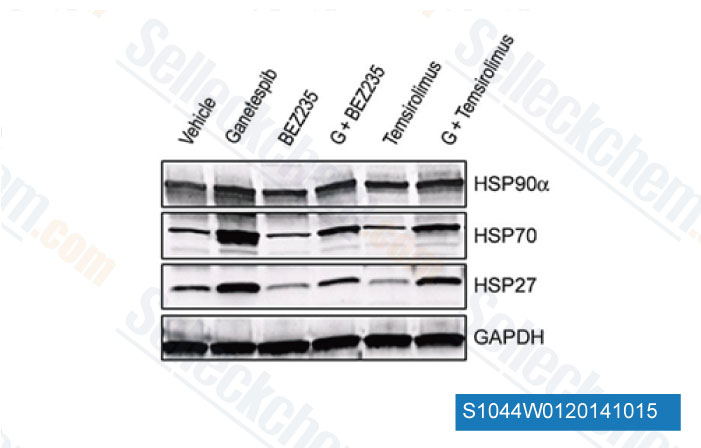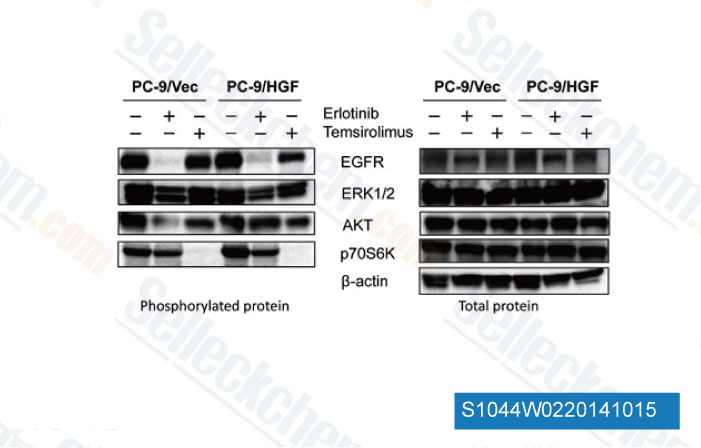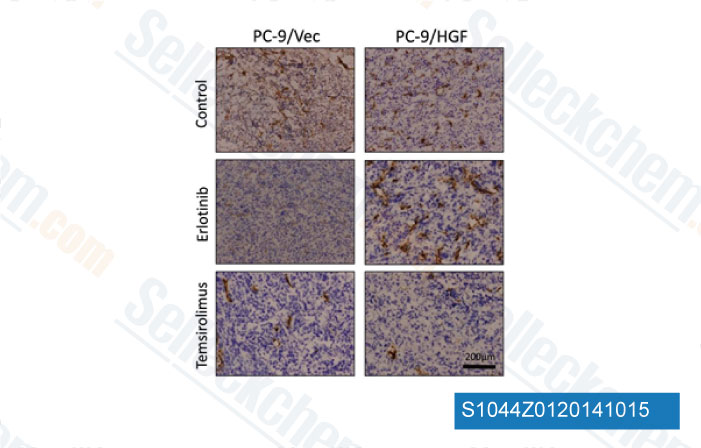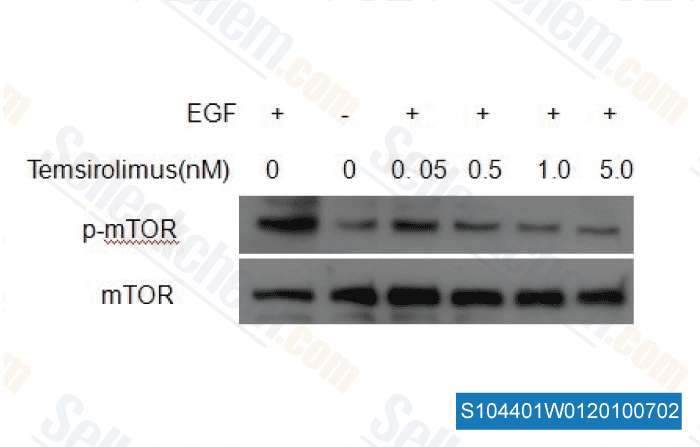|
Toll Free: (877) 796-6397 -- USA and Canada only -- |
Fax: +1-832-582-8590 Orders: +1-832-582-8158 |
Tech Support: +1-832-582-8158 Ext:3 Please provide your Order Number in the email. |
Technical Data
| Formula | C56H87NO16 |
|||
| Molecular Weight | 1030.29 | CAS No. | 162635-04-3 | |
| Solubility (25°C)* | In vitro | DMSO | 100 mg/mL (97.06 mM) | |
| Ethanol | 100 mg/mL (97.06 mM) | |||
| Water | Insoluble | |||
|
* <1 mg/ml means slightly soluble or insoluble. * Please note that Selleck tests the solubility of all compounds in-house, and the actual solubility may differ slightly from published values. This is normal and is due to slight batch-to-batch variations. * Room temperature shipping (Stability testing shows this product can be shipped without any cooling measures.) |
||||
Preparing Stock Solutions
Biological Activity
| Description | Temsirolimus is a specific mTOR inhibitor with IC50 of 1.76 μM in a cell-free assay. Temsirolimus induces autophagy and apoptosis. | ||
|---|---|---|---|
| Targets |
|
||
| In vitro | In the absence of FKBP12, Temsirolimus potently inhibits mTOR kinase activity with IC50 of 1.76 μM, similar to that of rapamycin with IC50 of 1.74 μM. Temsirolimus treatment at nanomolar concentrations (10 nM to <5 μM) displays a modest and selective antiproliferative activity via FKBP12-dependent mechanism, but can completely inhibit the proliferation of a broad panel of tumor cells at low micromolar concentrations (5-15 μM), involving FKBP12-independent suppression of mTOR signaling. Temsirolimus treatment at micromolar but not nanomolar concentrations (20 μM) causes a marked decline in global protein synthesis and disassembly of polyribosomes, accompanied by rapid increase in the phosphorylation of translation elongation factor eEF2 and the translation initiation factor eIF2A. [1] Temsirolimus inhibits the phosphorylation of ribosomal protein S6, more potently in PTEN-positive DU145 cells than in PTEN-negative PC-3 cells, and inhibits cell growth and clonogenic survival of both cells in a concentration-dependent manner. [2] Temsirolimus (100 ng/mL) potently inhibits proliferation and induces apoptosis in primary human lymphoblastic leukemia (ALL) cells. [3] | ||
| In vivo | In the NOD/SCID xenograft models with human ALL, Temsirolimus treatment at 10 mg/kg/day produces a decrease in peripheral blood blasts and in splenomegaly [3] Administration of Temsirolimus (20 mg/kg i.p. 5 days/week) significantly delays the growth of DAOY xenografts by 160% after 1 week and 240% after 2 weeks, compared with controls. Single high-dose of Temsirolimus (100 mg/kg i.p) treatment induces 37% regression of tumor volume within 1 week. Temsirolimus treatment for 2 weeks also delays the growth of rapamycin-resistant U251 xenografts by 148%. [4] Inhibition of mTOR by Temsirolimus improves performance on four different behavioral tasks and decreases aggregate formation in a mouse model of Huntington disease. [5] Administration of Temsirolimus induces significant dose-dependent, antitumor responses against subcutaneous growth of 8226, OPM-2, and U266 xenografts with ED50 of 20 mg/kg and 2 mg/kg for 8226 and OPM-2, respectively, which are associated with inhibited proliferation and angiogenesis, induction of apoptosis, and reduction in tumor cell size. [6] |
Protocol (from reference)
| Kinase Assay: |
|
|---|---|
| Cell Assay: |
|
| Animal Study: |
|
References
Customer Product Validation

-
Data from [Data independently produced by Mol Cancer Res, 2014, 12, 703-13]

-
Data from [Data independently produced by PLoS One, 2013, 8, e62104]

-
Data from [Data independently produced by PLoS One, 2013, 8, e62104]

-
Data independently produced by , , Dr. Zhang of Tianjin Medical University
Selleck's Temsirolimus has been cited by 104 publications
| Molecular control of PDPNhi macrophage subset induction by ADAP as a host defense in sepsis [ JCI Insight, 2025, e186456] | PubMed: 39903516 |
| Single-Molecule-Based, Label-Free Monitoring of Molecular Glue Efficacies for Promoting Protein-Protein Interactions Using YaxAB Nanopores [ ACS Nano, 2024, 18(45):31451-31465] | PubMed: 39482865 |
| The mTOR pathway controls phosphorylation of BRAF at T401 [ Cell Commun Signal, 2024, 22(1):428] | PubMed: 39223665 |
| Enzymatic depletion of circulating glutamine is immunosuppressive in cancers [ iScience, 2024, 27(6):109817] | PubMed: 38770139 |
| The combination of breast cancer PDO and mini-PDX platform for drug screening and individualized treatment [ J Cell Mol Med, 2024, 28(9):e18374] | PubMed: 38722288 |
| Multiplex single-cell chemical genomics reveals the kinase dependence of the response to targeted therapy [ Cell Genom, 2024, 4(2):100487] | PubMed: 38278156 |
| Long-term statins administration exacerbates diabetic nephropathy via ectopic fat deposition in diabetic mice [ Nat Commun, 2023, 14(1):390] | PubMed: 36693830 |
| Unbiased evaluation of rapamycin's specificity as an mTOR inhibitor [ Aging Cell, 2023, 22(8):e13888] | PubMed: 37222020 |
| Unbiased evaluation of rapamycin's specificity as an mTOR inhibitor [ Aging Cell, 2023, e13888.] | PubMed: 37222020 |
| A cisplatin conjugate with tumor cell specificity exhibits antitumor effects in renal cancer models [ BMC Cancer, 2023, 23(1):499] | PubMed: 37268911 |
RETURN POLICY
Selleck Chemical’s Unconditional Return Policy ensures a smooth online shopping experience for our customers. If you are in any way unsatisfied with your purchase, you may return any item(s) within 7 days of receiving it. In the event of product quality issues, either protocol related or product related problems, you may return any item(s) within 365 days from the original purchase date. Please follow the instructions below when returning products.
SHIPPING AND STORAGE
Selleck products are transported at room temperature. If you receive the product at room temperature, please rest assured, the Selleck Quality Inspection Department has conducted experiments to verify that the normal temperature placement of one month will not affect the biological activity of powder products. After collecting, please store the product according to the requirements described in the datasheet. Most Selleck products are stable under the recommended conditions.
NOT FOR HUMAN, VETERINARY DIAGNOSTIC OR THERAPEUTIC USE.
